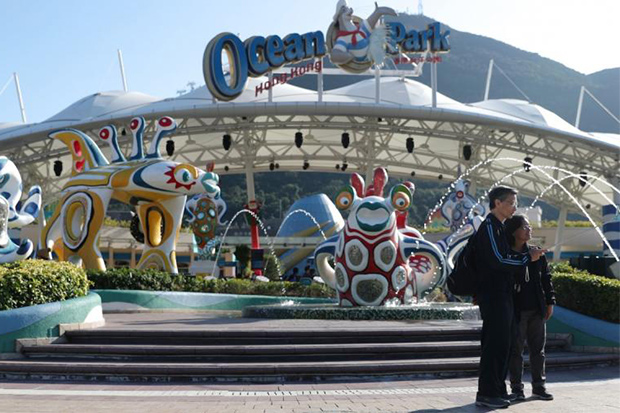
Hong Kong's two major theme parks will be reopened imminently as a key step in rebooting an economy reeling from the triple whammy of social unrest, the US-China trade war and the coronavirus pandemic.
Secretary for Commerce and Economic Development Edward Yau Tang-wah revealed on Monday that Ocean Park will greet guests on Saturday for the first time since closing on Jan 26 amid the pandemic. The Disneyland resort on Lantau Island will also resume operations soon, though a specific date has not been released.
Additionally, conventions and trade shows - almost completely absent in the first half of this year due to the public health crisis - will stage a comeback in July, with the much-loved Hong Kong Book Fair leading the way, he said.
"We want to reboot the economy in the second half of this year through new initiatives in tourism, external trade and trade insurance services," Yau said. "We are confident we will ride out the economic doldrums."
Hong Kong's economy faces fresh challenges now that the United States has pledged to remove special trading privileges in response to Beijing's planned security law for the city. The future holds the possibility of trade tariffs, more restrictions on technology transfers and policy changes on currency and visas.
The city's growth engines - retail, exports and logistics and tourism - were hit hard when months of social unrest first kicked off last June, a situation exacerbated by an ongoing trade war, then greatly intensified by the Covid-19 pandemic.
Ocean Park, which last month received a cash injection of HK$5.4 billion (US$697 million) to stay afloat, will drop its entrance fee by 30% for each adult visitor - to HK$350 - while offering free admission for children aged 11 or below and people aged 65 or above until the end of July.
In addition, the reduced adult ticket fees will be fully rebated in the form of cash vouchers for spending on food and gifts in the park.
Yau said while social-distancing rules might still restrict local tourism to a degree, the industry was putting measures in place to ensure public health. Current rules forbid public gatherings of larger than eight - including restaurant tables - until at least June 18.
Hong Kong Tourism Board chairman Pang Yiu-kai, meanwhile, said he was confident people were ready to start spending money locally again.
"People have been really hungry to go out and enjoy themselves, and they have been waiting for attractions to open. I think this is great news to a lot of Hong Kong people. I have no concerns that Ocean Park will not be able to bring in local tourists," he said.
Yau also expressed his belief that the government would be able to balance the need to revitalise the economy with health concerns, given the city's track record on the coronavirus.
"As things ease a bit, where we have confidence to see epidemic under control, then there's every reason for us to lift measures, provided public health is guaranteed," he said.
Tourism could also eventually get a boost from outside visitors, Yau said, with the city now actively looking into the possibility of so-called travel bubbles with other destinations that have been similarly successful in containing the pandemic.
"We are starting to explore the possibilities of some bilateral arrangements where Hong Kong can work with countries or economies where we're both [out from under] the risk of the epidemic," he said, suggesting an online discussion will be carried out with Thailand by the end of this month. The government is also looking into the situations in other Southeast Asian countries as well as Japan and Korea, he said.
"We have been asked by some governments, [and] we are also knocking on the doors of some governments where we see their fight against Covid-19 has achieved some early success, but we will be highly selective," Yau added.
The discussion will involve protocols on coronavirus testing, mutual recognition of test results, and would likely see the capacity for travel increased in phases, he said.
"The epidemic has remained a major challenge in many countries that we used to go to. It's a question not just dependent on Hong Kong's situation. The gradual approach would be pursuing some of the travel bubbles, and starting some bilateral talks. Unfortunately, I don't have a crystal ball."
Hong Kong Trade Development Council Peter Lam Kin-ngok added that the annual book fair, Asia's largest of its kind, would return between July 15 and 21. Last year it drew about 1 million visitors.
"As safety first, the book fair will not run at full capacity and people's traffic will be restricted," he said.
He added that the government would be offering HK$100,000 subsidies to each book exhibitor, at total outlay of HK$40 million, to ease their cash flow concerns.
According to the council, 15 conventions and trade fairs were postponed from the first half to the second half of this year.
To mitigate risks of Hong Kong trading firms, meanwhile, the government-backed Hong Kong Export Credit Insurance Corporation will offer 100 per cent coverage of a credit facility up to HK$100 million at the same premium they’re now paying for coverage of HK$50 million.
In the first quarter of this year, the city’s economy contracted 8.9% year on year, the steepest quarterly drop since record-keeping began in 1974. The previous record low of 8.3% in the July-September quarter of 1998 came during the Asian financial crisis.
As the city ground to a standstill amid a wider global lockdown, January-April tourist arrivals collapsed 85.3% from the same period last year while retail sales slumped 35.3%.
More than 65 global airlines cut flights by about 95% in April and May, and Hong Kong closed all but three border checkpoints. Schools were closed until just this month and social-distancing rules for restaurants and public gatherings are in full force until June 18.